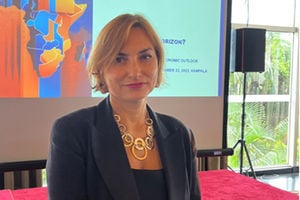
Author: Patrick Katagata. PHOTO/FILE
Uganda recently conducted the 2024 National Census. Despite a few forgivable pitfalls on the part of the Uganda Bureau of Statistics (Ubos), I have noted with utter disappointment that a section of the citizenry was not enthusiastic about this very important exercise.
The data collected during census provides great understanding of key demographic ingredients such as population size, distribution, age structure, literacy rates, etc. which buttress evidence-based planning and policies for functional governance.
President Museveni has relentlessly preached wealth creation through agriculture with “ekibalo”, contrary to “nkolera kida” [subsistence]. This article explains why deliberate Science, Technology, and Innovation (STI) investment in the quest for a national socio-economic qualitative leap is significant.
Innovation helps its adopters to produce more with the same or fewer resources. This being self-evident in countries like Singapore with hardly any natural resources to talk about. What exponential dividends, then, might it render Uganda with insurmountable abundance thereof?
Contextually, ‘Ekibalo’ means not just ‘calculation’, but scientifically determining and purposefully working out one’s targeted gain from given endeavours. In Stephen R. Covey’s book, The 7 Habits of Highly Effective People, habit No. 2 is: “Begin with the end in mind.” Until this is feasibly determined, efforts and resources may be undesirably wasted.
Singapore’s founding father Lee Kuan Yew once opined: “No country develops by accident or co-incidence. Development is planned.”
I reminisced two books I read a few years ago by Daron Acemoğlu and James Robinson, Why Nations Fail; and Dan Senor and Saul Singer’s Start-Up Nation.
Nations, like all living organisms, are birthed and grow. Nation-building is never easy: some fail; yet others prosper. Why? Nations have unique resources; development needs; purpose; and destinies. Nations may fail because they benchmark nations hoping it, somehow, magically works for them too. But in effect very rarely does it.
Dr Monica Musenero, the minister for Science, Technology and Innovation, crowned it thus: “Nations develop best on the ideas people develop.”
Except for natural resources which vary, nations have three fundamental resources: natural resources; humans; and time. Strategic human capital development is crucial to national development.
Indeed, speaking in, From Third World to First Lee Kuan Yew recounted: “Singapore had no natural resources… When we started in 1959, we knew little about how to govern, or how to solve many of our economic and social problems.
All we had was a burning desire to change an unfair and unjust society for the better…The other valuable asset we had was our people—hard-working, thrifty, eager to learn… good basic infrastructure, and a government that was determined to be honest and competent.”
Uganda has both an abundance of natural resources, and almost all others—pointing to her highest potential for socio-economic transformation.
Benchmarking is necessary, but fanatically duplicating findings thereof may be precarious. Obsessive benchmarking inadvertently blurs exploration of indigenous potential, rendering nations in question vulnerable to manipulation.
Examining factors that contribute to the success or failure of nations, Acemoğlu and Robinson, argue that inclusive political and economic institutions lead to prosperity. Political and economic strategies such as investment, innovation, and adopting new technologies are essential for socio-economic transformation.
Of course, some disruptions are well-expected, but dreaded as it might be, that’s the inevitable redemptive rugged path we must tread.




